高中限制性定语从句及非限制性定语从句概念区别及练习-含答案
- 格式:doc
- 大小:54.50 KB
- 文档页数:7
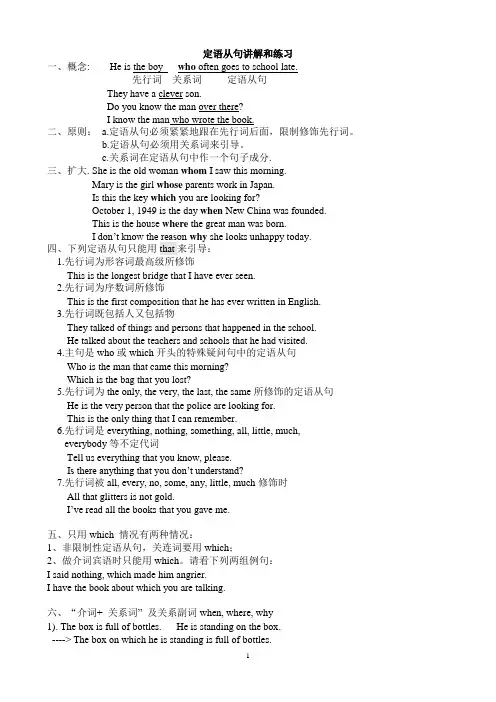
定语从句讲解和练习一、概念: He is the boy who often goes to school late.先行词关系词定语从句They have a clever son.Do you know the man over there?I know the man who wrote the book.二、原则: a.定语从句必须紧紧地跟在先行词后面,限制修饰先行词。
b.定语从句必须用关系词来引导。
c.关系词在定语从句中作一个句子成分.三、扩大. She is the old woman whom I saw this morning.Mary is the girl whose parents work in Japan.Is this the key which you are looking for?October 1, 1949 is the day when New China was founded.This is the house where the great man was born.I don’t know the reason why she looks unhappy today.四、下列定语从句只能用that来引导:1.先行词为形容词最高级所修饰This is the longest bridge that I have ever seen.2.先行词为序数词所修饰This is the first composition that he has ever written in English.3.先行词既包括人又包括物They talked of things and persons that happened in the school.He talked about the teachers and schools that he had visited.4.主句是who或which开头的特殊疑问句中的定语从句Who is the man that came this morning?Which is the bag that you lost?5.先行词为the only, the very, the last, the same所修饰的定语从句He is the very person that the police are looking for.This is the only thing that I can remember.6.先行词是everything, nothing, something, all, little, much,everybody等不定代词Tell us everything that you know, please.Is there anything that you don’t understand?7.先行词被all, every, no, some, any, little, much修饰时All that glitters is not gold.I’ve read all the books that you gave me.五、只用which 情况有两种情况:1、非限制性定语从句,关连词要用which;2、做介词宾语时只能用which。
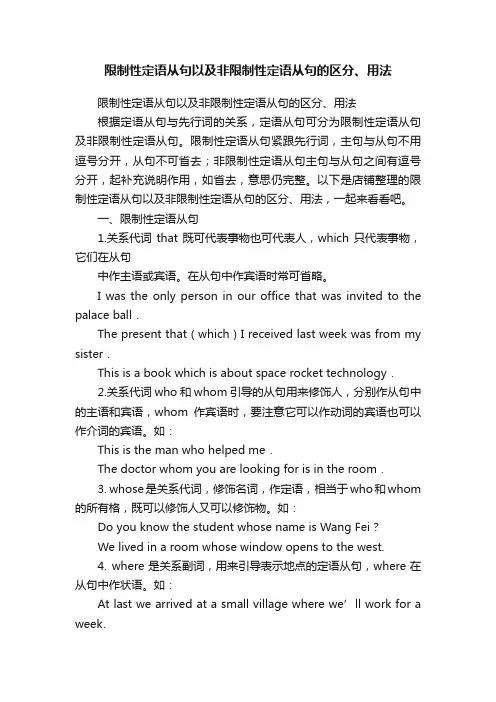
限制性定语从句以及非限制性定语从句的区分、用法限制性定语从句以及非限制性定语从句的区分、用法根据定语从句与先行词的关系,定语从句可分为限制性定语从句及非限制性定语从句。
限制性定语从句紧跟先行词,主句与从句不用逗号分开,从句不可省去;非限制性定语从句主句与从句之间有逗号分开,起补充说明作用,如省去,意思仍完整。
以下是店铺整理的限制性定语从句以及非限制性定语从句的区分、用法,一起来看看吧。
一、限制性定语从句1.关系代词that既可代表事物也可代表人,which只代表事物,它们在从句中作主语或宾语。
在从句中作宾语时常可省略。
I was the only person in our office that was invited to the palace ball.The present that(which)I received last week was from my sister.This is a book which is about space rocket technology.2.关系代词who和whom引导的从句用来修饰人,分别作从句中的主语和宾语,whom作宾语时,要注意它可以作动词的宾语也可以作介词的宾语。
如:This is the man who helped me.The doctor whom you are looking for is in the room.3. whose是关系代词,修饰名词,作定语,相当于who和whom 的所有格,既可以修饰人又可以修饰物。
如:Do you know the student whose name is Wang Fei?We lived in a room whose window opens to the west.4. where是关系副词,用来引导表示地点的定语从句,where在从句中作状语。
如:At last we arrived at a small village where we’ll work for a week.5. when是关系副词,引导定语从句表示时间,在从句中作状语。
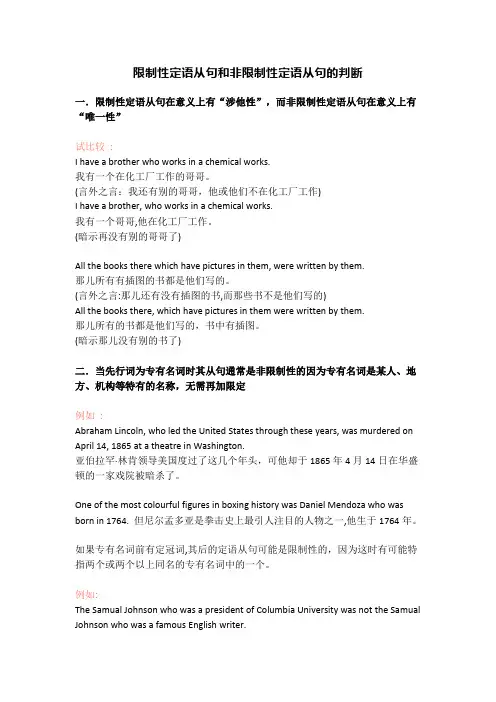
限制性定语从句和非限制性定语从句的判断一.限制性定语从句在意义上有“涉他性”,而非限制性定语从句在意义上有“唯一性”试比较:I have a brother who works in a chemical works.我有一个在化工厂工作的哥哥。
(言外之言:我还有别的哥哥,他或他们不在化工厂工作)I have a brother, who works in a chemical works.我有一个哥哥,他在化工厂工作。
(暗示再没有别的哥哥了)All the books there which have pictures in them, were written by them.那儿所有有插图的书都是他们写的。
(言外之言:那儿还有没有插图的书,而那些书不是他们写的)All the books there, which have pictures in them were written by them.那儿所有的书都是他们写的,书中有插图。
(暗示那儿没有别的书了)二.当先行词为专有名词时其从句通常是非限制性的因为专有名词是某人、地方、机构等特有的名称,无需再加限定例如:Abraham Lincoln, who led the United States through these years, was murdered on April 14, 1865 at a theatre in Washington.亚伯拉罕·林肯领导美国度过了这几个年头,可他却于1865年4月14日在华盛顿的一家戏院被暗杀了。
One of the most colourful figures in boxing history was Daniel Mendoza who was born in 1764. 但尼尔孟多亚是拳击史上最引人注目的人物之一,他生于1764年。
如果专有名词前有定冠词,其后的定语从句可能是限制性的,因为这时有可能特指两个或两个以上同名的专有名词中的一个。
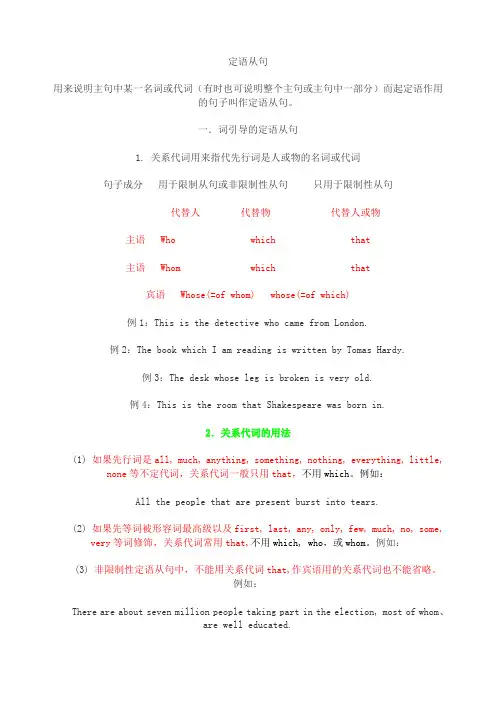
定语从句用来说明主句中某一名词或代词(有时也可说明整个主句或主句中一部分)而起定语作用的句子叫作定语从句。
一.词引导的定语从句1. 关系代词用来指代先行词是人或物的名词或代词句子成分用于限制从句或非限制性从句只用于限制性从句代替人代替物代替人或物主语 Who which that主语 Whom which that宾语 Whose(=of whom) whose(=of which)例1:This is the detective who came from London.例2:The book which I am reading is written by Tomas Hardy.例3:The desk whose leg is broken is very old.例4:This is the room that Shakespeare was born in.2.关系代词的用法(1) 如果先行词是all, much, anything, something, nothing, everything, little,none等不定代词,关系代词一般只用that,不用which。
例如:All the people that are present burst into tears.(2) 如果先等词被形容词最高级以及first, last, any, only, few, much, no, some,very等词修饰,关系代词常用that,不用which, who,或whom。
例如:(3) 非限制性定语从句中,不能用关系代词that,作宾语用的关系代词也不能省略。
例如:There are about seven million people taking part in the election, most of whom、are well educated.(4) which还有一种特殊用法,它可以引导从句修饰前面的整个主句,代替主句所表示的整体概念或部分概念。

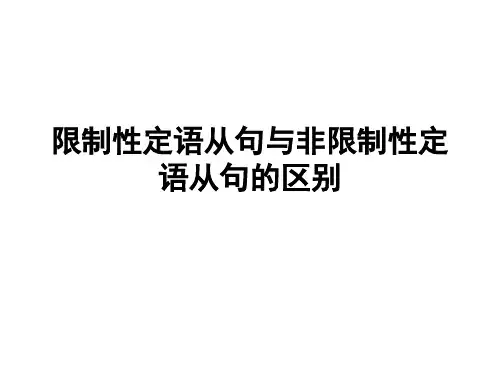
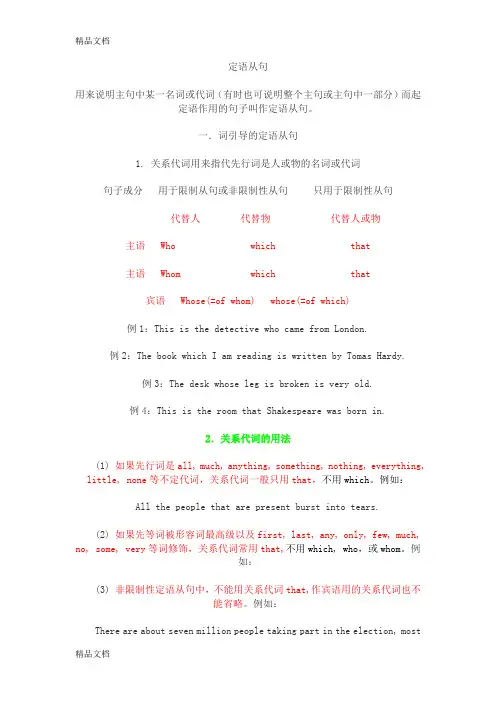
定语从句用来说明主句中某一名词或代词(有时也可说明整个主句或主句中一部分)而起定语作用的句子叫作定语从句。
一.词引导的定语从句1. 关系代词用来指代先行词是人或物的名词或代词句子成分用于限制从句或非限制性从句只用于限制性从句代替人代替物代替人或物主语 Who which that主语 Whom which that宾语 Whose(=of whom) whose(=of which)例1:This is the detective who came from London.例2:The book which I am reading is written by Tomas Hardy.例3:The desk whose leg is broken is very old.例4:This is the room that Shakespeare was born in.2.关系代词的用法(1) 如果先行词是all, much, anything, something, nothing, everything,little, none等不定代词,关系代词一般只用that,不用which。
例如: All the people that are present burst into tears.(2) 如果先等词被形容词最高级以及first, last, any, only, few, much, no, some, very等词修饰,关系代词常用that,不用which, who,或whom。
例如:(3) 非限制性定语从句中,不能用关系代词that,作宾语用的关系代词也不能省略。
例如:There are about seven million people taking part in the election, mostof whom、are well educated.(4) which还有一种特殊用法,它可以引导从句修饰前面的整个主句,代替主句所表示的整体概念或部分概念。
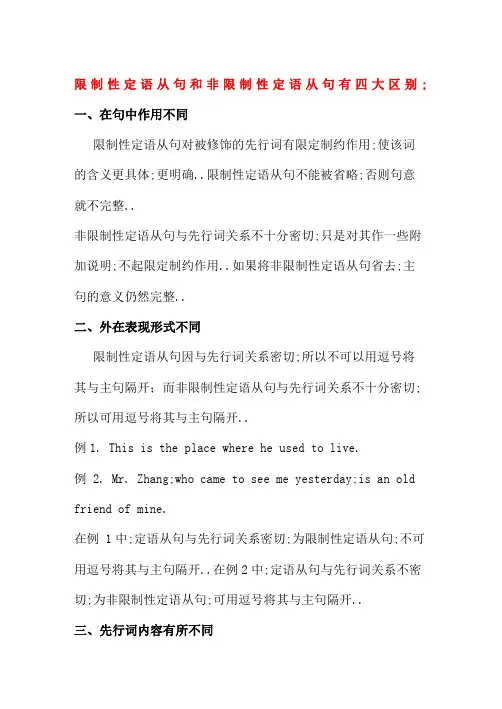
限制性定语从句和非限制性定语从句有四大区别;一、在句中作用不同限制性定语从句对被修饰的先行词有限定制约作用;使该词的含义更具体;更明确..限制性定语从句不能被省略;否则句意就不完整..非限制性定语从句与先行词关系不十分密切;只是对其作一些附加说明;不起限定制约作用..如果将非限制性定语从句省去;主句的意义仍然完整..二、外在表现形式不同限制性定语从句因与先行词关系密切;所以不可以用逗号将其与主句隔开;而非限制性定语从句与先行词关系不十分密切;所以可用逗号将其与主句隔开..例1. This is the place where he used to live.例 2. Mr. Zhang;who came to see me yesterday;is an old friend of mine.在例 1中;定语从句与先行词关系密切;为限制性定语从句;不可用逗号将其与主句隔开..在例2中;定语从句与先行词关系不密切;为非限制性定语从句;可用逗号将其与主句隔开..三、先行词内容有所不同大多数限制性和非限制性定语从句的先行词往往为某一个词或短语;而特殊情况下非限制性定语从句的先行词也可为整个主句;此时非限制性定语从句常由 which 引导..例:1. A middle-aged woman killed her husband;which frightened me very much.由语境可知;令“我”恐惧的内容应为“中年女子杀害了自己的丈夫”这整个一件事;因此先行词为整个主句;此时应由 which 引导定语从句..例:2. A five-year-old boy canspeak two foreign languages; which surprises all the people present.由语境可知;令所有在场的人感到惊讶的内容是“一个五岁男孩会讲两门外语”这整个一件事;因此先行词为整个主句;此时应由 which 引导非限制性定语从句..四、关系词的使用情况有所不同一 that 不可用于引导非限制性定语从句所有关系代词和关系副词均可引导限制性定语从句;大多数关系代词和关系副词可引导非限制性定语从句;但 that 不可..例如:他没通过这次考试;令我很失望..误:He didn't pass the exam;that disappointed me.正:He didn't pass the exam;which disappointed me.值得注意的是;不少同学误认为只有 which 才能引导非限制性定语从句;这个观点是不正确的..使用非限制性定语从句时;如果先行词指人;则用 who ; whom或 whose 引导非限制性定语从句;先行词指物可用 which 引导非限制性定语从句;先行词表时间或地点且在从句中作时间状语或地点状语时;可用when;where 引导非限制性定语从句..例1. We'll graduate in July;when we will be free.例2. Last Sunday they reached Nanjing;where a conference was to be held.二关系代词替代情况不同关系代词 whom 在限制性定语从句中作宾语时可用 who 代替 whom ;但 whom 在非限制性定语从句中作宾语时不可用 who 来代替..例: 1. This is the girl whom I met in the street.先行词 the girl 在限制性定语从句中作宾语;可用 who 代替whom .例: 2. A young man had a new girl friend;whom he wanted to impress.先行词 a new girl friend 在非限制性定语从句中作宾语;不可用 who 代替 whom .在限制性定语从句中;先行词指人时可用 that 代替 who/ whom ;但在非限制性定语从句中先行词指人时;不可用 that 代替who/whom .例:她有一个姐姐;她是教师..误: She has a sister;that is a teacher.正:She has a sister;who is teacher.三关系代词省略情况不同关系代词在限制性定语从句中作宾语时可以省去;非限制性定语从句的所有关系词均不可省..例 1. This is the bookwhich/thathe lost yesterday.先行词 the book 在限制性定语从句中作宾语;关系代词 which 或 that 可以省略..例 2. The book; which he lost yesterday; has been found.先行词 the book 在非限制性定语从句中作宾语;关系代词which 不可省..四as引导定语从句时的用法① as引导限制性定语从句通常用于the same … as; such … as 结构中..e.g. I want the same shirt as my friend’s.Such machines as are used in our workshop are made in China. 我们车间使用的这种机器是中国制造的..② as引导非限制性定语从句既可放在主句之前;也可放在主句之后;用来修饰整个句子..通常用下列句型:as is known to all; as is said; as is reported; as is announced; as we all know; as I expect 等..e.g. As I expected; he got the first place again in this mid-term examination.3as 引导非限制性定语从句时与which的区别① 当主句和从句语义一致时;用as;反之;用which来引导非限制性定语从句..e.g. He made a long speech; as we expected.He made a long speech; which was unexpected.② 当非限制定语从句为否定时;常用which引导..e.g. Tom drinks a lot every day; which his wife doesn’t likeat all.2. 定语从句有时不直接紧靠先行词;中间由一个定语、状语或谓语隔开..这种定语从句叫做分隔性定语从句e.g. There is an expression in his eyes that I can’t understand.4. 引导定语从句的关系副词有时可以用“介词+ which”来代替..e.g. October 1; 1949 was the day on which = when the People’s Republic of China was founded.5. 当定语从句中谓语动词是带介词或副词的固定短语动词时;短语动词的各个固定部分不要拆开..e.g. The sick man whom she is looking after is her father.6. 介词在关系代词前;只能用which和whom;且不能省略;介词在句尾;关系代词可以省略..定语从句练习、一、把下列每对句子合并成含有定语从句的主从复合句:1. The fan is on the desk. You want it.2. The man is in the next room. He brought our textbooks here yesterday.3. The magazine is mine. He has taken it away.4. The students will not pass the exam. They don’t study hard.5. The woman is our geography teacher. You saw her in the park.6. The letter is from my sister. I received it yesterday.7. The play was wonderful. We saw it last night.8. The train was late. It was going to Nanning.9. The boy is my brother. He was here a minute ago.10. The tree is quite tall. He is climbing it.11. Here is the girl. Her brother works in this shop.12. That’s the chi ld. We were looking at his drawing just now.13. This is the boy. His sister is a famous singer.14. I want to talk to the boys. Their homework haven’t been handed in.15. Is that the woman Her daughter is in my class.16. He used to live in a big house. In front of it grew many banana trees.17. They passed a factory. At the back of the factory there were rice fields.18. The soldier ran to the building. On the top of it flewa flag.19. In the evening they arrived at a hill. At the foot of the hill there was a temple.20. She came into a big room. In the middle of it stood a large table.二、根据句子意思;用介词+关系代词whom或which 完成下列句子.1. The person ________ ________ I spoke just now is themanager that I told you about.2. The pencil ________ ________ he was writing broke.3. Wu Dong; ________ ________ I went to the concert; enjoyed it very much.4. The two things ________ ________ Marx was not sure were the grammar and some of the idioms of English.5. Her bag; ________ ________ she put all her books; has not been found.6. The stories about the Long March; ________ ________ thisis one example; are well written.三、选择填空:1. The man ____ visited our school yesterday is from London.A. whoB. whichC. whomD. when2. The woman ____ is talking to my mother is a friend of hers.A. whoseB. whoC. whomD. which3. Because of my poor memory; all ____ you told me has been forgotten.A. thatB. whichC. whatD. as4. Do you remember those days ____ we spent along the seashore very happilyA. whenB. whereC. whichD. who5. Tom t took away the camera because it was just the samecamera ____ he lost last week.A. whichB. thatC. whomD. as6. Those ____ want to go please sign their names here.A. whomB. whichC. whoD. when7. Where is the man ____ I met this morningA. whenB. whereC. whichD. who8. Who is the woman ____ is sweeping the floor over thereA. whoB. /C. thatD. when9. The man ____ you talked just now is a worker.A. whoB. whomC. to whomD. to who10. The man ____ you are going to make friends is my father’s neighbour.A. with whomB. whenC. to whomD. which11. The doctor ____ is leaving for Africa next month.A. the nurse is talking to himB. whom the nurse is talkingC. the nurse is talking toD. who the nurse is talking12. The man ____ around our school is from America.A. which you showedB. you showed himC. you showedD. where you showed13. He talked about a hero ____ no one had ever heard.A. of whomB. from whomC. about thatD. who14. In fact the Swede did not understand the three questions____ were asked in French.A. whereB. whoC. in whichD. which15. Have you read the book ____ I lent to youA. thatB. whomC. whenD. whose16. Finally; the thief handed over everything ____ he had stolen to the police.A. thatB. whichC. whateverD. all17. The foreign guests; ____ were government officials; werewarmly welcomed at the airport.A. most of themB. most of thatC. most of whomD. most of those18. This is the very letter ____came last night.A. whoB. whichC. thatD. as19. I know only a little about this matter; you may ask ____ knows better than I.A. whoeverB. whomeverC. anyoneD. the one20. This is the school ____ we visited three days ago.A. whereB. /C. whenD. what21. This is the factory ____ we worked a year ago.A. whereB. thatC. whichD. on which22. Nearby were two canoes ____ they had come to the island.A. whichB. in whichC. thatD. /23. Jack is pleased with ____ you have given him and all ____ you have told him.A. that; whatB. what; thatC. which; whatD. that; which24. Do you work near the building ____ colour is yellowA. thatB. whichC. itsD. whose25. In the dark street; there wasn’t a single person ____ she could turn for help.A. whomB. whoC. to whomD. form whom26. Is this school ____ we visited three years agoA. the oneB. whichC. thatD. where27. Is this the school ____ we visited three years agoA. the oneB. whereC. in whichD. /28; How many students are there in your class ____ homes are in the countryA. whoseB. whoC. whomD. which29. Alice received an invitation from her boss; ____ cameas a surprise.A. itB. whichC. thatD. he30. The train was crowded and I had to get into a carriage____ already seven other people.A. when there wereB. which there wereC. that there wereD. where there were31. I live in the house ____ windows face south.A. whichB. whoseC. whereD. that32. ---- What game is popular with them---- The ____ most is tennis.A. game they like itB. game they likeC. best game they likeD. best game they like it33. They stayed with me three weeks; ____ they drank all the wine I had.A. whichB. which timeC. during whichD. during which time34. The room ____ Mr White lives is not very large.A. thatB. whichC. whereD. when35. Don’t forget the day ____ you were received into theYouth League.A. whenB. thatC. at whichD. where36. I’ve finished writing the novel; ____ is to be published next month.A. thatB. whatC. whichD. when37. He returned home safe and sound after a fierce battle; ____ was unexpected.A. whichB. asC. thatD. it38. ____ is known to all; English is not very difficult to learn.A. WhatB. AsC. ThatD. Which39. The old man had three sons; all of ____ died during World War Ⅱ.A. whoseB. thatC. whomD. who40. I have bought two pens; ____ write well.A. none of whichB. neither of whichC. both of whichD. all of which41. Do you know the reason ____ she has changed her mindA. whyB. whichC. for thatD. of which42. He failed in the exam; ____ proves that he wasn’t working hard enough.A. whichB. whatC. itD. that43. During the week ____ he tried to collect materials for his article.A. followingB. followedC. to followD. that followed44. ____ was expected; he succeeded in the exam.A. ItB. WhichC. AsD. That45. He studied hard and later became a well-known writer; ____ his father expected.A. that was whatB. what was thatC. and which wasD. which was what46. We should read such books ____ will make us better and wiser.A. whenB. asC. whoseD. what47. You must show my wife the same respect ____ you show me.A. whenB. asC. whoseD. what48. He is absent; ____ is often the case.A. whatB. whichC. whoD. as49. It is the first time ____ I have come to your city.A. thatB. whichC. whatD. when50. Who ____ has the same idea as it will do it in this way.A. whoB. thatC. whomD. which51. I shall never forget those years ____ I lived in thecountry with the farmers; ____ has a great effect on my life.A. that; whichB. when; whichC. which; thatD. when; who52. This is the only book ____ I can find.A. thatB. whichC. itD. with which53. I don’t like ____ you speak to her.A. the wayB. the way in thatC. the way whichD. the way of which54. That is one of those books that ____ worth reading.A. isB. areC. hasD. have55. This is the only one of the students whose handwriting ____ the best.A. isB. areC. hasD. have定语从句参考答案一、1. The fan that you want is on the desk.2. The man who brought our textbooks here yesterday is in next room.3. The magazine which he has taken away is mine.4. The students who don’t study hard will not pass the exam.5. The woman you saw in the park is our geography teacher.6. The letter I received yesterday is from my sister.7. The play that we saw last night was wonderful.8. The train which was going to Nanning was late.9. The boy who was here a minute ago is my brother.10. The tree he is climbing is quite tall.11. Here is the girl whose brother works in this shop.12. That’s the child whose drawing we were looking at just now.13. This is the boy whose sister is a favous singer.14. I want to talk to the boy whose homework hasn’t beenhanded in.15. Is that the woman whose daughter is in my class16. He used to live in a big house; in front of which grew many banana trees.17. They passed a factory; at the back of which there were rice fields.18. The soldier ran to the building; on the top of which flewa flag.19. In the evening they arrived at a hill; at the foot of which there was a temple.20. She came into a big room; in the middle of which stooda large table.二、1. to whom; 2. wiht which; 3. with whom;4. about which;5. in which;6. of which三、1~5 ABACD 6~10 CDCCA 11~15 CCADA 16~20 ACCAB21~25 ABBDC 26~30 ADABD 31~35 BBDCA 36~40 CABCC 41~45 AADCD 46~50 BBDAB 51. BAABA。
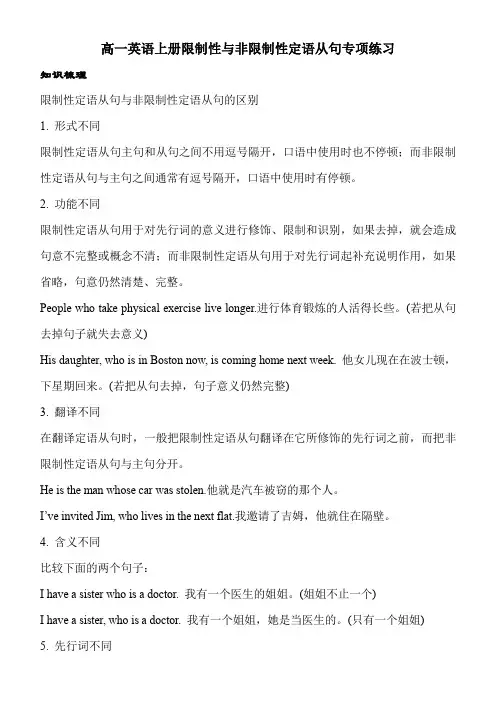
高一英语上册限制性与非限制性定语从句专项练习知识梳理限制性定语从句与非限制性定语从句的区别1. 形式不同限制性定语从句主句和从句之间不用逗号隔开,口语中使用时也不停顿;而非限制性定语从句与主句之间通常有逗号隔开,口语中使用时有停顿。
2. 功能不同限制性定语从句用于对先行词的意义进行修饰、限制和识别,如果去掉,就会造成句意不完整或概念不清;而非限制性定语从句用于对先行词起补充说明作用,如果省略,句意仍然清楚、完整。
People who take physical exercise live longer.进行体育锻炼的人活得长些。
(若把从句去掉句子就失去意义)His daughter, who is in Boston now, is coming home next week. 他女儿现在在波士顿,下星期回来。
(若把从句去掉,句子意义仍然完整)3. 翻译不同在翻译定语从句时,一般把限制性定语从句翻译在它所修饰的先行词之前,而把非限制性定语从句与主句分开。
He is the man whose car was stolen.他就是汽车被窃的那个人。
I’ve invited Jim, who lives in the next flat.我邀请了吉姆,他就住在隔壁。
4. 含义不同比较下面的两个句子:I have a sister who is a doctor. 我有一个医生的姐姐。
(姐姐不止一个)I have a sister, who is a doctor. 我有一个姐姐,她是当医生的。
(只有一个姐姐)5. 先行词不同限制性定语从句的先行词只能是名词或代词,而非限制性定语从句的先行词则可以是名词或代词,也可以是短语或句子;另外,当先行词为专有名词或其他具有独一无二性的普通名词时,通常要用非限制性定语从句,而不用限制性定语从句。
Peter drove too fast, which was dangerous.彼得开车很快,这是很危险的。
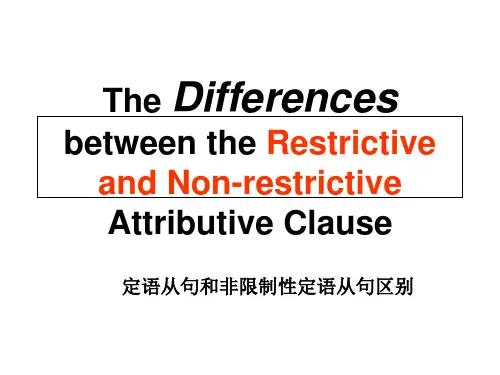
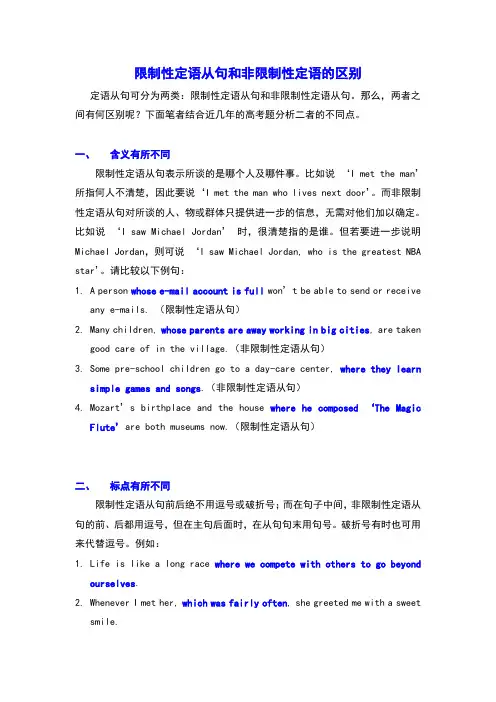
限制性定语从句和非限制性定语的区别定语从句可分为两类:限制性定语从句和非限制性定语从句。
那么,两者之间有何区别呢?下面笔者结合近几年的高考题分析二者的不同点。
一、含义有所不同限制性定语从句表示所谈的是哪个人及哪件事。
比如说‘I met the man’所指何人不清楚,因此要说‘I met the man who lives next door’。
而非限制性定语从句对所谈的人、物或群体只提供进一步的信息,无需对他们加以确定。
比如说‘I saw Michael Jordan’时,很清楚指的是谁。
但若要进一步说明Michael Jordan,则可说‘I saw Michael Jordan, who is the greatest NBA star’。
请比较以下例句:1.A person whose e-mail account is full won’t be able to send or receiveany e-mails. (限制性定语从句)2.Many children,whose parents are away working in big cities, are takengood care of in the village.(非限制性定语从句)3.Some pre-school children go to a day-care center,where they learnsimple games and songs.(非限制性定语从句)4.Mozart’s birthplace and the house where he composed ‘The MagicFlute’are both museums now.(限制性定语从句)二、标点有所不同限制性定语从句前后绝不用逗号或破折号;而在句子中间,非限制性定语从句的前、后都用逗号,但在主句后面时,在从句句末用句号。
破折号有时也可用来代替逗号。
导入练习11.—Is that the small company you often refer to?—Right, just the one you know my father used to work for years.A.thatB. whichC. whereD. As2.—Where did they fi nish the experiment?—It was in the lab was taken charge of by Prof. Smith.A.whereB. /C. whichD. in which3.Examination compositions, together with most business letters and government reports, are the main situations formal language is used.A.in whichB. in thatC. of whichD. of that4.Which fi lm is the one main actor has won the Best Actor Prize in the fi lm festival?A.whoB. whomC. whoseD. which5.In that country, November 30th is a national festival everyone, men and women, old and young, sings and dances happily in the streets.A.whereB. whenC. thatD. as6.This is John Brown, I think has something interesting to tell you.A.whichB. whomC. thatD. who7.We climbed the Huangshan Mountain yesterday, , not surprisingly, was crowded with visitors from all over the world.A.whereB. whichC. thatD. when8.The famous football player, a big party will be held tomorrow morning, is to arrive this afternoon.A.in honour of himB. in his honourC. in whose honourD. in which honour9. was reported in the newspaper, seventeen passengers had been killed in the traffi c accident.A.ItB. AsC. WhatD. That10.The owner paid the worker $10 for tidying the whole building, most of hadn’t been cleaned for at least a year.A.thatB. whatC. whenD. which11.He has made great contributions to the science of physics, he was awarded the 2009 Nobel Prize.A.about whichB. whatC. for whichD. when12.I don’t want to use the same tool you used yesterday to repair the air conditioner.A.itB. thatC. oneD. what13.They were interested you told them.A.in whichB. in thatC. all thatD. in everything14.Is that the reason you are in favor of the proposal?A.whichB. whatC. whyD. for that15.I have bought the same dress she is wearing.A.asB. thatC. whichD. what限制性定语从句提供有关主语或宾语的重要信息,起限定作用,与被修饰部分的关系紧密,如果省略该从句会使主句语义表达不完整。
导入练习1 1. — Is that the small company you often refer to— Right; just the one _______ you know my father used to work for years.A.thatB. whichC. whereD. As2. — Where did they fi nish the experiment— It was in the lab _______ was taken charge of by Prof. Smith.A. whereB. /C. whichD. in which3. Examination compositions; together with most business letters and government reports; are the main situations _______ formal language is used.A. in whichB. in thatC. of whichD. of that4. Which fi lm is the one _______ main actor has won the Best Actor Prize in the fi lm festivalA. whoB. whomC. whoseD. which5. In that country; November 30th is a national festival _______ everyone; men and women; old and young; sings and dances happily in the streets.A. whereB. whenC. thatD. as6. This is John Brown; _______ I think has something interesting to tell you.A. whichB. whomC. thatD. who7. We climbed the Huangshan Mountain yesterday; _______; not surprisingly; was crowded with visitors from all over the world.A. whereB. whichC. thatD. when8. The famous football player; _______ a big party will be held tomorrow morning; is to arrive this afternoon.A. in honour of himB. in his honourC. in whose honourD. in which honour9. _______ was reported in the newspaper; seventeen passengers had been killed in the traffi c accident.A. ItB. AsC. WhatD. That10. The owner paid the worker $10 for tidying the whole building; most of _______ hadn’t been cleaned for at least a year.A. thatB. whatC. whenD. which11. He has made great contributions to the science of physics; _______ he was awarded the 2009 Nobel Prize.A. about whichB. whatC. for whichD. when12. I don’t want to use the same tool _______ you used yesterday to repair the air conditioner.A. itB. thatC. oneD. what13. They were interested _______ you told them.A. in whichB. in thatC. all thatD. in everything14. Is that the reason _______ you are in favor of the proposalA. whichB. whatC. whyD. for that15. I have bought the same dress _______ she is wearing.A. asB. thatC. whichD. what限制性定语从句提供有关主语或宾语的重要信息;起限定作用;与被修饰部分的关系紧密;如果省略该从句会使主句语义表达不完整..例如:This is the very person that is wanted by the police.He is the man who /that lives next door.非限制性定语从句只是用来对被修饰部分作补充性的说明;与先行词关系比较松散;先行词与从句间可以用逗号隔开;从句可略去:The minister; who is to visit our university; is said to bea Qinghua University graduate.The businessman; whose suitcase has been found by a stranger;has left for Beijing.如果定语从句的先行词是专有名词或是带有形容词性物主代词my;his; etc或形容词性指示代词this; that; etc作限定词的名词词组;其后的定语从句通常为非限制性的..例如:My mother; who has been on a visit to Australia; will fly back tomorrow..限制性定语从句的先行词只能是名词;代词或名词性词组;而非限制性定语从句的先行词除了是名词及名词性词组外;还可能是句子的一部分或是整个句子..例如:They say he plays truant; which he doesn’t. which指代plays truantThe meeting was put off till next month; as we hoped. as 指前面的句子下面的表格归纳了前面已提到的两者不同之处:as的用法1、as引导限制性定语从句时;常与such或the same连用;构成thesame…as; such…as结构;as用于代替指人或物的先行词..例如:I have never eaten such tasty foods as she cooked me.试比较the same…as和the same…that:This is the same book as I read last week.这和我上周读的那本书是一样的..This is the same book that I read last year.这就是我上周读的那本书..如果先行词表示抽象概念;则没有这种区别;例如:She told me the same story as/that she had told you.在as/so…as结构中;后面的as也是关系代词;例如:We took as many men as could be permitted to attend the meeting.2、引导非限制性定语从句关系代词as引导非限制性定语从句时;用于代替整个主句;意思是“正如”; 相当于 and this或 and that..as从句位置较之which 引导的非限制性定语从句更加灵活;因而as从句既可以指前面提到的内容;也可以指后面将要提到的内容;which一般在主句后..例如:The test is cancelled; as you have hoped.The test; as you have hoped; is cancelled.▲注:as代表前面的整个主句并在从句中做主语时表达的意思应与主句一致;而且从句中的谓语必须是系动词;若为行为动词;则从句中的关系代词只能用which.例如:He failed to pass the exam again; as is predicted.He failed to pass the exam again; which annoyed his mother greatly.记住以下的as结构:as is known to all 众所周知;as is often the case 情况常常如此;as the name Indicates/suggests 顾名思义;as may be imagined 可以想象得出;as often happens 这种情况常常发生;as has been said before 如前所述;as has been pointed out 正如已经指出的;as will be shown in 将在…中指出;as is hoped 正如所希望的3 介词 + 关系代词“介词 + 关系代词”引导的定语从句既可以是限制性定语从句;又可以是非限制性定语从句;“介词+关系代词”在从句中做主语、宾语、状语、定语等;介词的选择则要根据它与其先行词的关系或前后名词、动词等的搭配关系来决定;同时还应该考虑句子在上下文中要表达的意思..4.“介词 + which/whom/whose”这时应注意介词与句中短语的搭配..例如:The problem with which I have trouble has now been solved.介词放在关系代词之前的形式的定语从句较之将介词至于从句之末的定语从句正式;因此多用于书面语当中;但在口语中有时也会出现;或者将介词后置;或在介词后置后用 that人、物/who人代替which/whom;并且that可省略..例如;Can you lend me a pen or pencil with which I can writeCan you lend me a pen or pencil that/ which I can write with5.“介词 + which + 名词”引导的定语从句which是一个代表所有关系的关系代词;可用来代表一个名词/代词或句子的一部分;但更多地是来代表整个句子..其中的名词通常是一个抽象名词;如case; fact; state; time; point等..例如:Water boils at l00℃;at which temperature it changes into gas.He was about to leave; at which moment I came back home.6.定语从句中的关系副词关系副词引导的定语从句限制性/非限制性在从句中作状语;意思相当于“介词+which”;常见的引导定语从句的关系副词有:where;when和why等;不常见的如表示时间的关系副词:since; after和before..7.关系副词 where= at; in which引导表示地点的定语从句This is the place where he’d most like to live the rest of his life.That is the place where they met for the first time.在表示“情况、方面、状况”等有地点含义的抽象名词如case;game; spot; point; conditions; situation; circumstances等作为先行词的定语从句时;也用 where引导; 其意义相当于 under which..例如:It’s a kind of game where you can train your eyesight 8.关系副词 when= at; on; during; in which引导表示时间的定语从句I’ll never forget the day when =on which I first came to this university.This is the season when =in which most fishers will be very busy.9. 关系副词 why= for which引导表示原因的定语从句Do you know the reason why he left the party early that nightThe reason why she missed the train is that she was held up by an accident.10. 关系代词与关系副词的判断看①谓语动词是否及物用关系代词还是关系副词完全取决于从句中的谓语动词..从句中如果及物动词后面接宾语;就必须要用关系代词;而不及物动词则要求用关系副词..例如:The days when we stayed together are unforgettable.stay不及物I’ll never forget the days which I spent with you in Tokyo .spend及物;有宾语This is the reason why he did not come that e不及物动词This is the reason which/ that he found to excuse for himself.find及物动词②先行词在定语从句中的成分主、谓、宾、定、状先行词表示时间、地点或原因时;就选用关系副词;用when;where 或why;在从句中应该是做状语;否则的话则应该用which/that 等;that有时可以代替when;where或why;但when;where或why中不能代替that..例如:1. Is this museum you visited a few days agoA. whereB. thatC. on whichD. theone2. Is this the museum the exhibition was held.A. whereB. thatC. on whichD. theone在句 1中;所缺部分为宾语;而where;that;on which都不能起到宾语的作用;只有the one既做了主句的表语;又可做从句的宾语;可以省略关系代词;所以应选 D;而在句2中;主、谓、宾俱全;从句部分为句子的状语表地点;既可用副词 where;又因 in the museum词组;可用介词 in+which 引导地点状语..而此题中;介词on用的不对;所以选A..当从句的逻辑主语是some; any; no; somebody; anybody; nobody;something; anything; everything或nothing时;常用there is来引导..例如:I don’t want to concentrate on anything there is worryingme.限制性定语从句和非限制性定语从句六大区别及练习区别一:形式不同限定性定语从句主句和从句之间不用逗号隔开;口语中使用时也不停顿;而非限定性定语从句与主句之间通常有逗号隔开;口语中使用时有停顿..区别二:功能不同限定性定语从句用于对先行词的意义进行修饰、限制和识别;如果去掉;就会造成句意不完整或概念不清;而非限定性定语从句用于对先行词起补充说明作用;如果省略;句意仍然清楚、完整..如:People who take physical exercise live longer. 进行体育锻炼的人活得长些..若把从句去掉句子就失去意义His daughter; who is in Boston now; is coming home next week. 他女儿现在在波士顿;下星期回来..若把从句去句子意义仍然完整区别三:翻译不同在翻译定语从句时;一般把限定性定语从句翻译在它所修饰的先行词之前;而把非限定性定语从句与主句分开..如:He is the man whose car was stolen. 他就是汽车被窃的那个人..I’ve invited Jim; who lives in the next flat. 我邀请了吉姆;他就住在隔壁..区别四:含义不同比较下面的两个句子:I have a sister who is a doctor. 我有一个医生的姐姐..姐姐不止一个I have a sister; who is a doctor. 我有一个姐姐;她是当医生的..只有一个姐姐区别五:先行词不同限定性定语从句的先行词只能是名词或代词;而非限定性定语从句的先行词则可以是名词或代词;也可以是短语或句子;另外;当先行词为专有名词或其他具有独一无二性的普通名词时;通常要用非限制性定语从句;而不用限制性定语从句..如:Peter drove too fast; which was dangerous. 彼得开车很快;这是很危险的..which指drive too fastHe changed his mind; which made me very angry. 他改变了主意;这使我很生气..which指整个主句Mr. Smith; who is our boss; will leave for Japan next week. 我们的老板史密斯先生下周要去日本..先行词为专有名词;要用非限制性定语从句修饰Her father; who has a lot of money; wishes her to study abroad. 她父亲很有钱;希望她出国学习..先行词为表独一无二意义的普通名词;要用非限制性定语从句修饰区别六:关系词不同关系词that和why可用于限制性定语从句中;通常不用于非限制性定语从句;另外;在限制性定语从句中;关系词有时可以省略参见本章有关内容;而在非限制性定语从句中关系词一律不省略..巩固练习1. The place _______interested me most was the Children's Palace.A. WhichB. whereC. whatD. in which2. Do you know the man _______A. whom I spokeB. to who spokeC. I spoke toD. that I spoke3. This is the hotel _______last month.A. which they stayedB. at that they stayedC. where they stayed atD. where they stayed4. Do you know the year ______the Chinese Communist Party was foundedA. whichB. thatC. whenD. on which5. That is the day ______I'll never forget.A. whichB. on whichC. in whichD. when6. The factory ______we'll visit next week is not far from here.A. whereB. to whichC. whichD. in which7. Great changes have taken place since then in the factory _______we are working.A. whereB. thatC. whichD. there8. This is one of the best films _______.A. that have been shown this yearB. that have shownC. that has been shown this yearD. that you talked9. Can you lend me the book ______the other dayA. about which you talkedB. which you talkedC. about that you talkedD. that you talked10. The pen ______he is writing is mine.A. with whichB. in whichC. on whichD. by which11.They arrived at a farmhouse; in front of ______sat a small boy.A. whomB. whoC. whichD. that12.The engineer ______my father works is about 50 years old.A. to whomB. on whomC. with whichD. with whom13.It there anyone in your class ______family is in the countryA. whoB. who'sC. whichD. whose14.I'm interested in ______you have said.A. all thatB. all whatC. thatD. which15.I want to use the same dictionary ______was used yesterday.A. whichB. whoC. whatD. as16.He isn't such a man ______he used to be.A. whoB. whomC. thatD. as17.He is good at English; ______we all know.A. thatB. asC. whomD. what18.Li Ming; ______to the concert enjoyed it very much.A. I went withB. with whom I wentC. with who I wentD.I went with him19.I don't like ______ as you read.A. the novelsB. the such novelsC. such novelsD. same novels20.He talked a lot about things and persons ________they remembered in the school.A. WhichB. thatC. whomD. what21.The letter is from my sister; ______is working in Beijing.A. whichB. thatC. whomD. who。
定语从句讲解及巩固练习一、定语从句的概念关系词(引导定语从句)↑1.People who have the highest EQ are the most successful↓先行词(被修饰词)二、定语从句的分类1. 限制性定语从句: 与先行词关系密切, 如果没有定语从句, 主句不完整, 且与先行词之间无逗号。
2. 非限制性定语从句: 对先行词起补充说明作用, 如果删除, 主句意义仍然完整, 与先行词之间有逗号。
eg: On the desk there are twenty books, three of which are mine.My aunt Alice ,whom I haven’t seen for years, is coming next month.★ that不能用于非限制性定语从句。
三、定语从句的关系词1. 指人的关系代词: who / whom / that1) 先行词在从句中作主语eg: A doctor is a person who / that looks after people’s health.2) 先行词在从句中作宾语eg: Mr White invited many friends to his party (who / whom / that) he respected much.3) 关系代词前有介词eg: Nancy is the right person on whom you can depend.小结:⑴ 指人的关系代词中,在从句中充当主语的是who和that,且在句中不可以省略。
⑴ 指人的关系代词中, 在从句中充当宾语的是who,that和whom,且可以省略。
⑴ 当关系代词前有介词时,指人只能用whom。
2. 指物的关系代词: which / that1) 先行词在从句中作主语eg: The river which / that runs through the city brings us lots of pleasure.2)先行词在从句中作宾语eg: The book (which / that) you just laid on the shelf is mine.3)关系代词前有介词eg: Here is the money with which I will buy a piano.3. 表示所有格:whose (既表示人的所有也表示物的所有)1) 表示人的所有eg: The girl whose father is a model worker is our monitor.2) 表示物的所有eg: I’d like a room whose window looks out over the sea.弄清as和which引导的非限制性定语从句指代整体时的区别★位置上的区别:as引导的非限制性定语从句的位置比较灵活,可以放在主句前,也可以放在主句后,还可插在主句的中间;而which引导的非限制性定语从句只能放在主句之后。
为⼤家整理的限制性定语和⾮限制性定语从句怎么区分,供⼤家学习参考!限制性定语从句:限制性定语从句对先⾏词起限制、修饰的作⽤,关系代词有that,which,whom,who,whose以及关系副词when,where等,没有明显的逗号把从句与主语分开,表达的意思为被修饰词的⼀个定语。
例句:Do you know the professor who is speaking at the meeting?Where is the book which I bought this morning?⾮限制性定语从句:作⽤相当于⼀种插⼊语或者对先⾏词的⼀种解释,和先⾏词之间只有⽐较松散的关系,⽂字中常常⽤逗号将其与主句分开,⽤法其实与限制性定语从句极为相似,只是不能⽤that做修饰词。
例句:This letter is from his parents, who are working in Tibet.Englishi is an important subject, which every students should study well.The building, in front of which sat a boy, was a school.⼀、定语从句有限制性和⾮限制性两种。
限制性定语从句是先⾏词不可缺少的部分,去掉它主句意思往往不明确;⾮限制性定语从句是先⾏词的附加说明,去掉了也不会影响主句的意思,它与主句之间通常⽤逗号分开,例如:This is the house which we bought last month. 这是我们上个⽉买的那幢房⼦。
(限制性)The house, which we bought last month, is very nice.这幢房⼦很漂亮,是我们上个⽉买的。
(⾮限制性)2) 当先⾏词是专有名词或物主代词和指⽰代词所修饰时,其后的定语从句通常是⾮限制性的,例如:Charles Smith, who was my former teacher, retired last year. 查理·史密斯去年退休了,他曾经是我的⽼师。
限制性定语从句和非限制性定语从句一、定语的概念:定语通常由形容词来担任,起限定和修饰名词或代词的作用。
① She is a beautiful girl.(beautiful是定语)二、定语从句的概念:由一个句子来担任定语的功能,相当于一个形容词,用来限定和修饰名词或代词。
① She is a girl who is beautiful.(who is beautiful这整个句子做定语)三、定语从句中的概念例:This is an old computer. It works much slower.(这是两个简单句,其中后一句中的it代替an old computer)→This is an old computer which/that works much slower.(这是一个复合句,which/that代替an old computer 引导定语从句)②The CD is very good. I bought the CD.→The CD that/which I bought is very good.③This is the house.We lived in the house two years ago.→This is the house where we lived two years ago.A.先行词:是被定语从句所修饰的名词或代词B.关系词:引导定语从句的词►关系词主要起三个作用:1.代替先行词2.在定语从句中作句子成分引导从句3.把从句和主句连接起来四、定语从句的分类:限制性定语从句和非限制性定语从句五、限制性定语从句与非限制性定语从句的区别:①形式不同:限制性定语从句紧跟先行词,与先行词之间一般不加逗号,仅修饰先行词。
非限制性定语从句仅作为补充或说明,用逗号与主句隔开,既可修饰先行词,又可修饰整个句子。
Eg:This is the house which we bought last month. (限制性)The house, which we bought last month, is very nice. (非限制性)②功能不同:限定性定语从句用于对先行词的意义进行修饰、限制和识别,如果去掉,就会造成句意不完整或概念不清。
非限制性定语从句及限制性定语从句语法知识点与相关练习语法知识点非限定性定语从句起补充说明作用,缺少也不会影响全句的理解,在非限定性定语从句的前面往往有逗号隔开,如若将非限定性定语从句放在句子中间,起前后都需要用逗号隔开。
①引导非限定性定语从句的关系代词:指代对象指代人指代物主格who which,as宾格whom which,as所有格of whom, whose which, of which, whose②引导非限定性定语从句的关系副词主要有:when,where使用规则及注意事项1. which引导的非限定性定语从句是用来说明前面整个句子的情况或主句的某一部分。
2. 在引导非限定性定语从句时,that有时相当于in which, for which或at which 。
其中,介词的选用,依据从句中的动词所需搭配的介词来选用。
例句:①Attitudes towards daydreaming are changing in much the same way that(in which) attitudes towards night dreaming have changed.人们对白日做梦的态度正在改变,这与人们对夜间做梦的看法的变化有非常相似之处。
②I like the music for the very reason that(for which) he dislike it.我出于某种原因喜欢这种音乐,而他恰恰与我相反。
③We arrived the day that(on which) they left.刚好我们到的那天他们走了。
3. as有时也可用作关系代词。
4. 在非限定性定语从句中,关系词不能用that。
区别1.限定性定语从句: 从句不能省略,如果省略整个句子意思不完整。
非限定性定语从句: 从句可以省略,如果省略整个句子意思仍然完整。
2.限定性定语从句: 先行词可以用that 引导。
导入练习11. —Is that the small company you often refer to?—Right, just the one _______ you know my father used to work for years.A.thatB. whichC. whereD. As2. —Where did they fi nish the experiment?—It was in the lab _______ was taken charge of by Prof. Smith.A. whereB. /C. whichD. in which3. Examination compositions, together with most business letters and government reports, are the main situations _______ formal language is used.【A. in whichB. in thatC. of whichD. of that4. Which fi lm is the one _______ main actor has won the Best Actor Prize in the fi lm festival?A. whoB. whomC. whoseD. which5. In that country, November 30th is a national festival _______ everyone, men and women, old and young, sings and dances happily in the streets.A. whereB. whenC. thatD. as6. This is John Brown, _______ I think has something interesting to tell you.A. whichB. whomC. thatD. who7. We climbed the Huangshan Mountain yesterday, _______, not surprisingly, was crowded with visitors from all over the world.~A. whereB. whichC. thatD. when8. The famous football player, _______ a big party will be held tomorrow morning, is to arrive this afternoon.A. in honour of himB. in his honourC. in whose honourD. in which honour9. _______ was reported in the newspaper, seventeen passengers had been killed in the traffi c accident.A. ItB. AsC. WhatD. That10. The owner paid the worker $10 for tidying the whole building, most of _______ hadn’t been cleaned for at least a year.A. thatB. whatC. whenD. which11. He has made great contributions to the science of physics, _______ he was awarded the 2009 Nobel Prize."A. about whichB. whatC. for whichD. when12. I don’t want to use the same tool _______ you used yesterday to repair the air conditioner.A. itB. thatC. oneD. what13. They were interested _______ you told them.A. in whichB. in thatC. all thatD. in everything14. Is that the reason _______ you are in favor of the proposal?A. whichB. whatC. whyD. for that15. I have bought the same dress _______ she is wearing.~A. asB. thatC. whichD. what限制性定语从句提供有关主语或宾语的重要信息,起限定作用,与被修饰部分的关系紧密,如果省略该从句会使主句语义表达不完整。
例如:This is the very person that is wanted by the police.He is the man who /that lives next door.非限制性定语从句只是用来对被修饰部分作补充性的说明,与先行词关系比较松散,先行词与从句间可以用逗号隔开,从句可略去:The minister, who is to visit our university, is said to be a Qinghua University graduate.The businessman, whose suitcase has been found by a stranger, has left for Beijing.如果定语从句的先行词是专有名词或是带有形容词性物主代词(my, his, etc)或形容词性指示代词(this, that, etc)作限定词的名词词组,其后的定语从句通常为非限制性的。
例如:¥My mother, who has been on a visit to Australia, will fly back tomorrow..限制性定语从句的先行词只能是名词,代词或名词性词组,而非限制性定语从句的先行词除了是名词及名词性词组外,还可能是句子的一部分或是整个句子。
例如:They say he plays truant, which he doesn’t. [which指代plays truant]The meeting was put off till next month, as we hoped. [as指前面的句子]下面的表格归纳了前面已提到的两者不同之处:表一:限制性定语从句与非限制性定语从句的区别》as的用法1、as引导限制性定语从句时,常与such或the same连用,构成the same…as; such…as结构,as用于代替指人或物的先行词。
例如:I have never eaten such tasty foods as she cooked me.试比较the same…as和the same…that:This is the same book as I read last week.(这和我上周读的那本书是一样的。
)This is the same book that I read last year.(这就是我上周读的那本书。
)如果先行词表示抽象概念,则没有这种区别,例如:She told me the same story as/that she had told you.!在as/so…as结构中,后面的as也是关系代词,例如:We took as many men as could be permitted to attend the meeting.2、引导非限制性定语从句关系代词as引导非限制性定语从句时,用于代替整个主句,意思是“正如”,相当于and this或and that。
as从句位置较之which引导的非限制性定语从句更加灵活,因而as从句既可以指前面提到的内容,也可以指后面将要提到的内容,which一般在主句后。
例如:The test is cancelled, as you have hoped.The test, as you have hoped, is cancelled.▲注:as代表前面的整个主句并在从句中做主语时表达的意思应与主句一致,而且从句中的谓语必须是系动词;若为行为动词,则从句中的关系代词只能用which.例如:He failed to pass the exam again, as is predicted.;He failed to pass the exam again, which annoyed his mother greatly.记住以下的as结构:as is known to all (众所周知),as is often the case (情况常常如此),as the name Indicates/suggests (顾名思义),as may be imagined (可以想象得出),as often happens (这种情况常常发生),as has been said before (如前所述),as has been pointed out (正如已经指出的),as will be shown in ( 将在…中指出),as is hoped ( 正如所希望的)3 介词+ 关系代词“介词+ 关系代词”引导的定语从句既可以是限制性定语从句,又可以是非限制性定语从句,“介词+关系代词”在从句中做主语、宾语、状语、定语等,介词的选择则要根据它与其先行词的关系或前后名词、动词等的搭配关系来决定,同时还应该考虑句子在上下文中要表达的意思。
4.“介词+ which/whom/whose”这时应注意介词与句中短语的搭配。
例如:The problem with which I have trouble has now been solved.-介词放在关系代词之前的形式的定语从句较之将介词至于从句之末的定语从句正式,因此多用于书面语当中,但在口语中有时也会出现;或者将介词后置,或在介词后置后用that(人、物)/who(人)代替which/whom,并且that可省略。
例如;Can you lend me a pen or pencil with which I can write?Can you lend me a pen or pencil that/ which I can write with?5.“介词+ which + 名词”引导的定语从句which是一个代表所有关系的关系代词,可用来代表一个名词/代词或句子的一部分,但更多地是来代表整个句子。